Business Academic Skills Report: P-O-L-C Framework and Management
VerifiedAdded on 2021/05/31
|6
|987
|190
Report
AI Summary
This report provides an evaluation of the P-O-L-C framework, a fundamental model in management encompassing planning, organizing, leading, and controlling. It examines each component, detailing the processes and considerations involved. The planning phase includes strategic, tactical, and operational planning, emphasizing the importance of setting objectives and identifying alternative courses of action. Organizing focuses on structuring tasks and departmentalization. Leading highlights the significance of social influence and motivation, citing examples like Howard Schultz's leadership style. Controlling ensures adherence to standards and requires accountability. The report further assesses the impact of managers on organizational performance, emphasizing the significance of well-executed performance management, employee engagement, and leveraging employee strengths to achieve organizational goals. It concludes that effective managers influence employee perceptions and enhance enterprise success. The report references various scholarly articles to support its analysis.
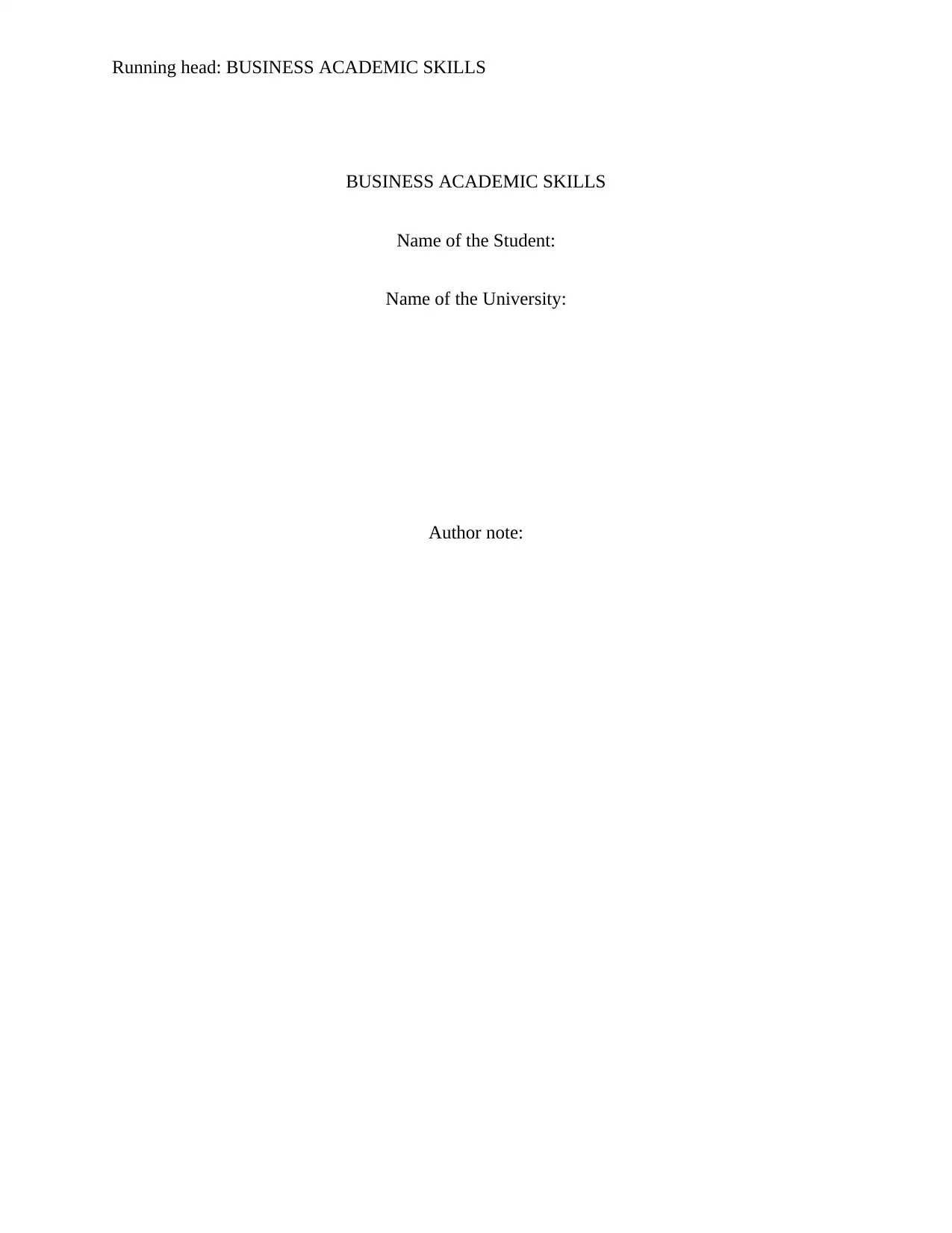
Running head: BUSINESS ACADEMIC SKILLS
BUSINESS ACADEMIC SKILLS
Name of the Student:
Name of the University:
Author note:
BUSINESS ACADEMIC SKILLS
Name of the Student:
Name of the University:
Author note:
Paraphrase This Document
Need a fresh take? Get an instant paraphrase of this document with our AI Paraphraser
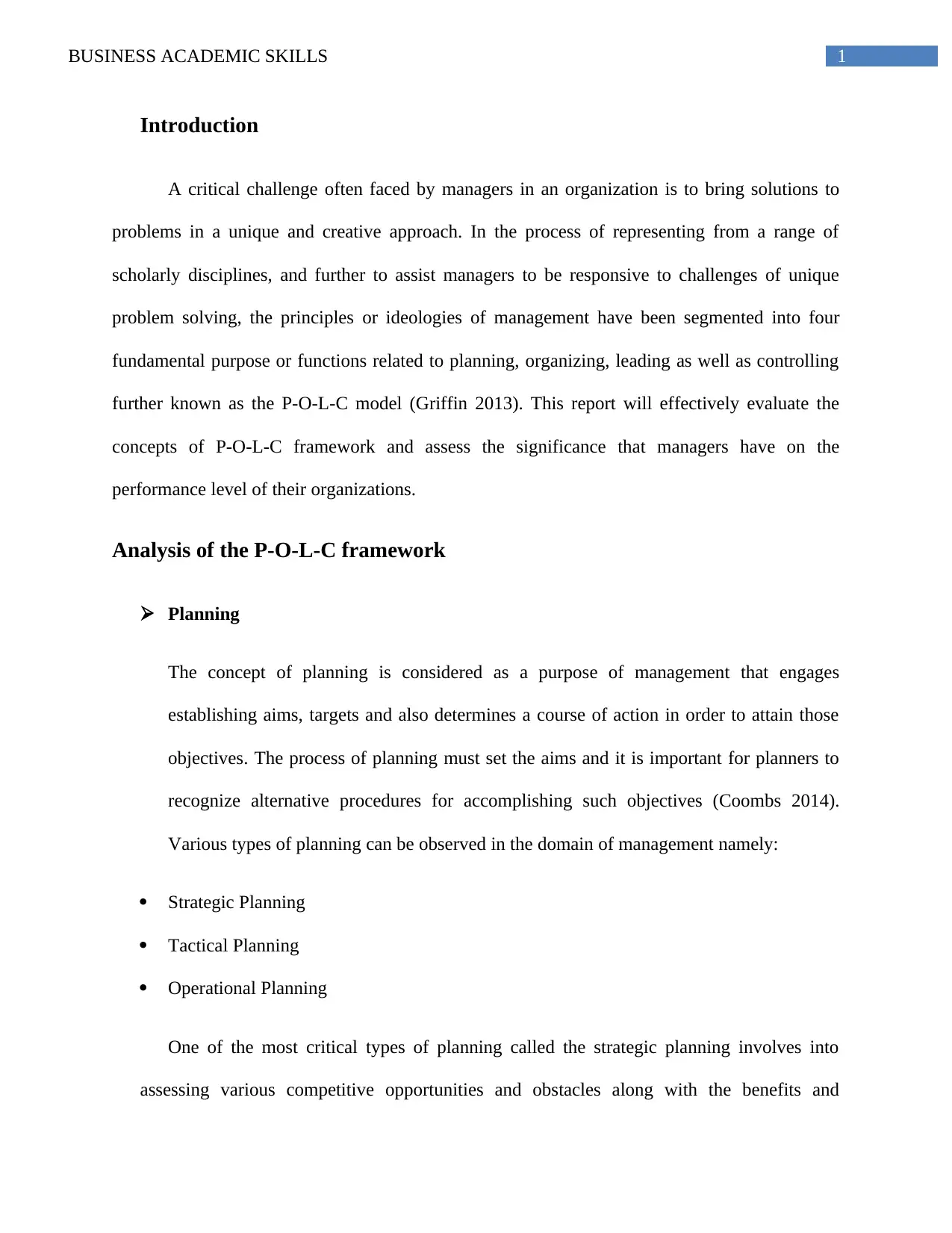
1BUSINESS ACADEMIC SKILLS
Introduction
A critical challenge often faced by managers in an organization is to bring solutions to
problems in a unique and creative approach. In the process of representing from a range of
scholarly disciplines, and further to assist managers to be responsive to challenges of unique
problem solving, the principles or ideologies of management have been segmented into four
fundamental purpose or functions related to planning, organizing, leading as well as controlling
further known as the P-O-L-C model (Griffin 2013). This report will effectively evaluate the
concepts of P-O-L-C framework and assess the significance that managers have on the
performance level of their organizations.
Analysis of the P-O-L-C framework
Planning
The concept of planning is considered as a purpose of management that engages
establishing aims, targets and also determines a course of action in order to attain those
objectives. The process of planning must set the aims and it is important for planners to
recognize alternative procedures for accomplishing such objectives (Coombs 2014).
Various types of planning can be observed in the domain of management namely:
Strategic Planning
Tactical Planning
Operational Planning
One of the most critical types of planning called the strategic planning involves into
assessing various competitive opportunities and obstacles along with the benefits and
Introduction
A critical challenge often faced by managers in an organization is to bring solutions to
problems in a unique and creative approach. In the process of representing from a range of
scholarly disciplines, and further to assist managers to be responsive to challenges of unique
problem solving, the principles or ideologies of management have been segmented into four
fundamental purpose or functions related to planning, organizing, leading as well as controlling
further known as the P-O-L-C model (Griffin 2013). This report will effectively evaluate the
concepts of P-O-L-C framework and assess the significance that managers have on the
performance level of their organizations.
Analysis of the P-O-L-C framework
Planning
The concept of planning is considered as a purpose of management that engages
establishing aims, targets and also determines a course of action in order to attain those
objectives. The process of planning must set the aims and it is important for planners to
recognize alternative procedures for accomplishing such objectives (Coombs 2014).
Various types of planning can be observed in the domain of management namely:
Strategic Planning
Tactical Planning
Operational Planning
One of the most critical types of planning called the strategic planning involves into
assessing various competitive opportunities and obstacles along with the benefits and
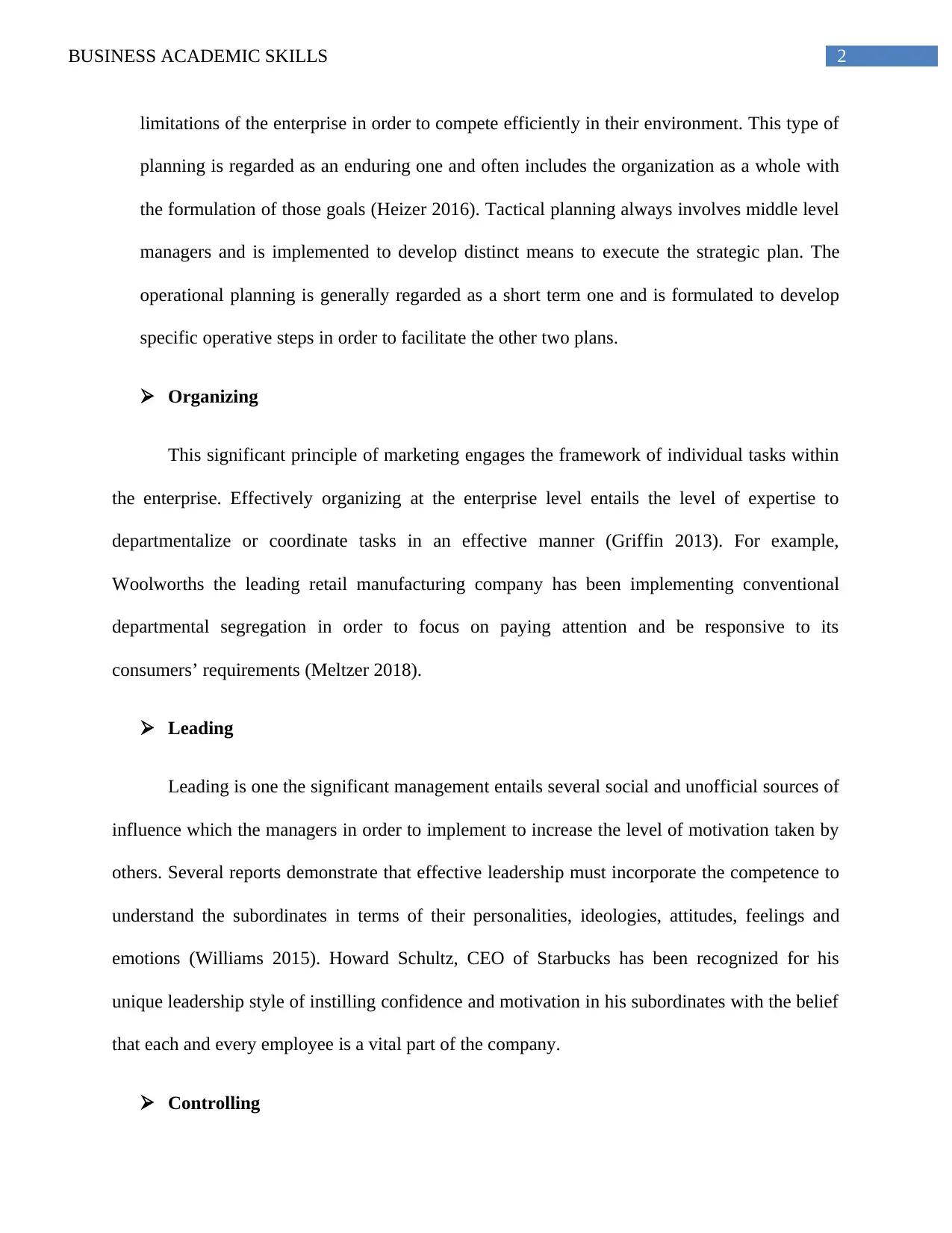
2BUSINESS ACADEMIC SKILLS
limitations of the enterprise in order to compete efficiently in their environment. This type of
planning is regarded as an enduring one and often includes the organization as a whole with
the formulation of those goals (Heizer 2016). Tactical planning always involves middle level
managers and is implemented to develop distinct means to execute the strategic plan. The
operational planning is generally regarded as a short term one and is formulated to develop
specific operative steps in order to facilitate the other two plans.
Organizing
This significant principle of marketing engages the framework of individual tasks within
the enterprise. Effectively organizing at the enterprise level entails the level of expertise to
departmentalize or coordinate tasks in an effective manner (Griffin 2013). For example,
Woolworths the leading retail manufacturing company has been implementing conventional
departmental segregation in order to focus on paying attention and be responsive to its
consumers’ requirements (Meltzer 2018).
Leading
Leading is one the significant management entails several social and unofficial sources of
influence which the managers in order to implement to increase the level of motivation taken by
others. Several reports demonstrate that effective leadership must incorporate the competence to
understand the subordinates in terms of their personalities, ideologies, attitudes, feelings and
emotions (Williams 2015). Howard Schultz, CEO of Starbucks has been recognized for his
unique leadership style of instilling confidence and motivation in his subordinates with the belief
that each and every employee is a vital part of the company.
Controlling
limitations of the enterprise in order to compete efficiently in their environment. This type of
planning is regarded as an enduring one and often includes the organization as a whole with
the formulation of those goals (Heizer 2016). Tactical planning always involves middle level
managers and is implemented to develop distinct means to execute the strategic plan. The
operational planning is generally regarded as a short term one and is formulated to develop
specific operative steps in order to facilitate the other two plans.
Organizing
This significant principle of marketing engages the framework of individual tasks within
the enterprise. Effectively organizing at the enterprise level entails the level of expertise to
departmentalize or coordinate tasks in an effective manner (Griffin 2013). For example,
Woolworths the leading retail manufacturing company has been implementing conventional
departmental segregation in order to focus on paying attention and be responsive to its
consumers’ requirements (Meltzer 2018).
Leading
Leading is one the significant management entails several social and unofficial sources of
influence which the managers in order to implement to increase the level of motivation taken by
others. Several reports demonstrate that effective leadership must incorporate the competence to
understand the subordinates in terms of their personalities, ideologies, attitudes, feelings and
emotions (Williams 2015). Howard Schultz, CEO of Starbucks has been recognized for his
unique leadership style of instilling confidence and motivation in his subordinates with the belief
that each and every employee is a vital part of the company.
Controlling
⊘ This is a preview!⊘
Do you want full access?
Subscribe today to unlock all pages.

Trusted by 1+ million students worldwide
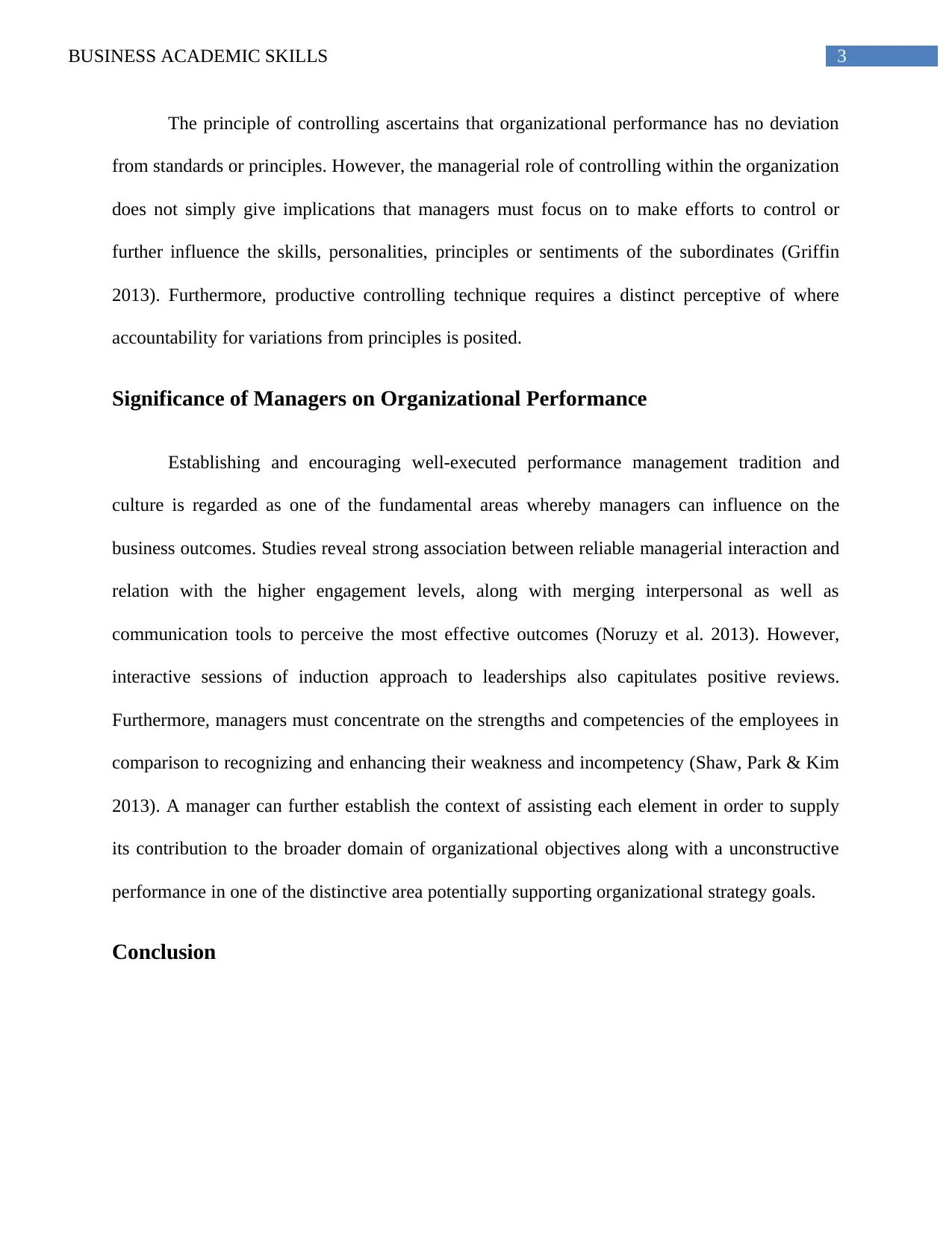
3BUSINESS ACADEMIC SKILLS
The principle of controlling ascertains that organizational performance has no deviation
from standards or principles. However, the managerial role of controlling within the organization
does not simply give implications that managers must focus on to make efforts to control or
further influence the skills, personalities, principles or sentiments of the subordinates (Griffin
2013). Furthermore, productive controlling technique requires a distinct perceptive of where
accountability for variations from principles is posited.
Significance of Managers on Organizational Performance
Establishing and encouraging well-executed performance management tradition and
culture is regarded as one of the fundamental areas whereby managers can influence on the
business outcomes. Studies reveal strong association between reliable managerial interaction and
relation with the higher engagement levels, along with merging interpersonal as well as
communication tools to perceive the most effective outcomes (Noruzy et al. 2013). However,
interactive sessions of induction approach to leaderships also capitulates positive reviews.
Furthermore, managers must concentrate on the strengths and competencies of the employees in
comparison to recognizing and enhancing their weakness and incompetency (Shaw, Park & Kim
2013). A manager can further establish the context of assisting each element in order to supply
its contribution to the broader domain of organizational objectives along with a unconstructive
performance in one of the distinctive area potentially supporting organizational strategy goals.
Conclusion
The principle of controlling ascertains that organizational performance has no deviation
from standards or principles. However, the managerial role of controlling within the organization
does not simply give implications that managers must focus on to make efforts to control or
further influence the skills, personalities, principles or sentiments of the subordinates (Griffin
2013). Furthermore, productive controlling technique requires a distinct perceptive of where
accountability for variations from principles is posited.
Significance of Managers on Organizational Performance
Establishing and encouraging well-executed performance management tradition and
culture is regarded as one of the fundamental areas whereby managers can influence on the
business outcomes. Studies reveal strong association between reliable managerial interaction and
relation with the higher engagement levels, along with merging interpersonal as well as
communication tools to perceive the most effective outcomes (Noruzy et al. 2013). However,
interactive sessions of induction approach to leaderships also capitulates positive reviews.
Furthermore, managers must concentrate on the strengths and competencies of the employees in
comparison to recognizing and enhancing their weakness and incompetency (Shaw, Park & Kim
2013). A manager can further establish the context of assisting each element in order to supply
its contribution to the broader domain of organizational objectives along with a unconstructive
performance in one of the distinctive area potentially supporting organizational strategy goals.
Conclusion
Paraphrase This Document
Need a fresh take? Get an instant paraphrase of this document with our AI Paraphraser
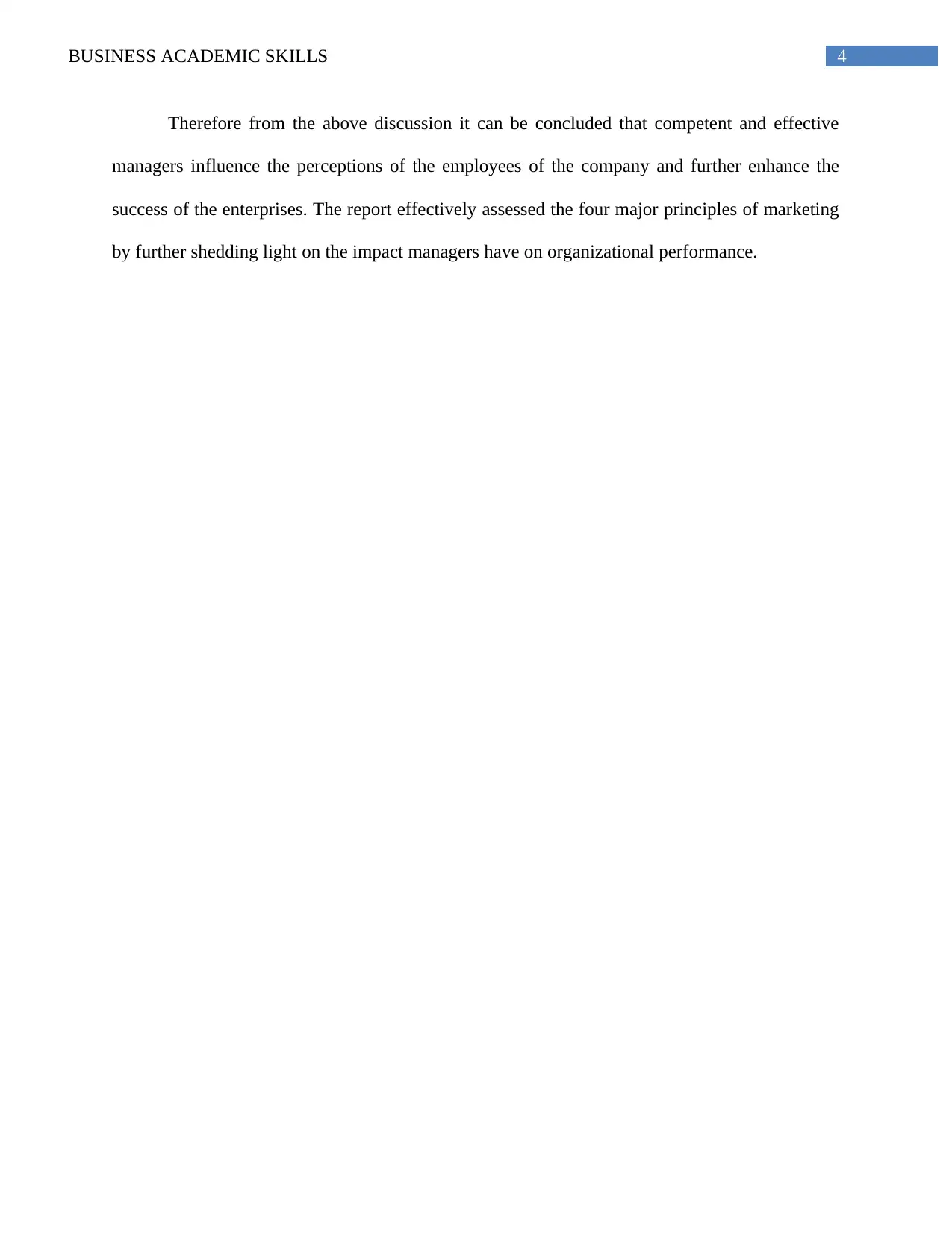
4BUSINESS ACADEMIC SKILLS
Therefore from the above discussion it can be concluded that competent and effective
managers influence the perceptions of the employees of the company and further enhance the
success of the enterprises. The report effectively assessed the four major principles of marketing
by further shedding light on the impact managers have on organizational performance.
Therefore from the above discussion it can be concluded that competent and effective
managers influence the perceptions of the employees of the company and further enhance the
success of the enterprises. The report effectively assessed the four major principles of marketing
by further shedding light on the impact managers have on organizational performance.
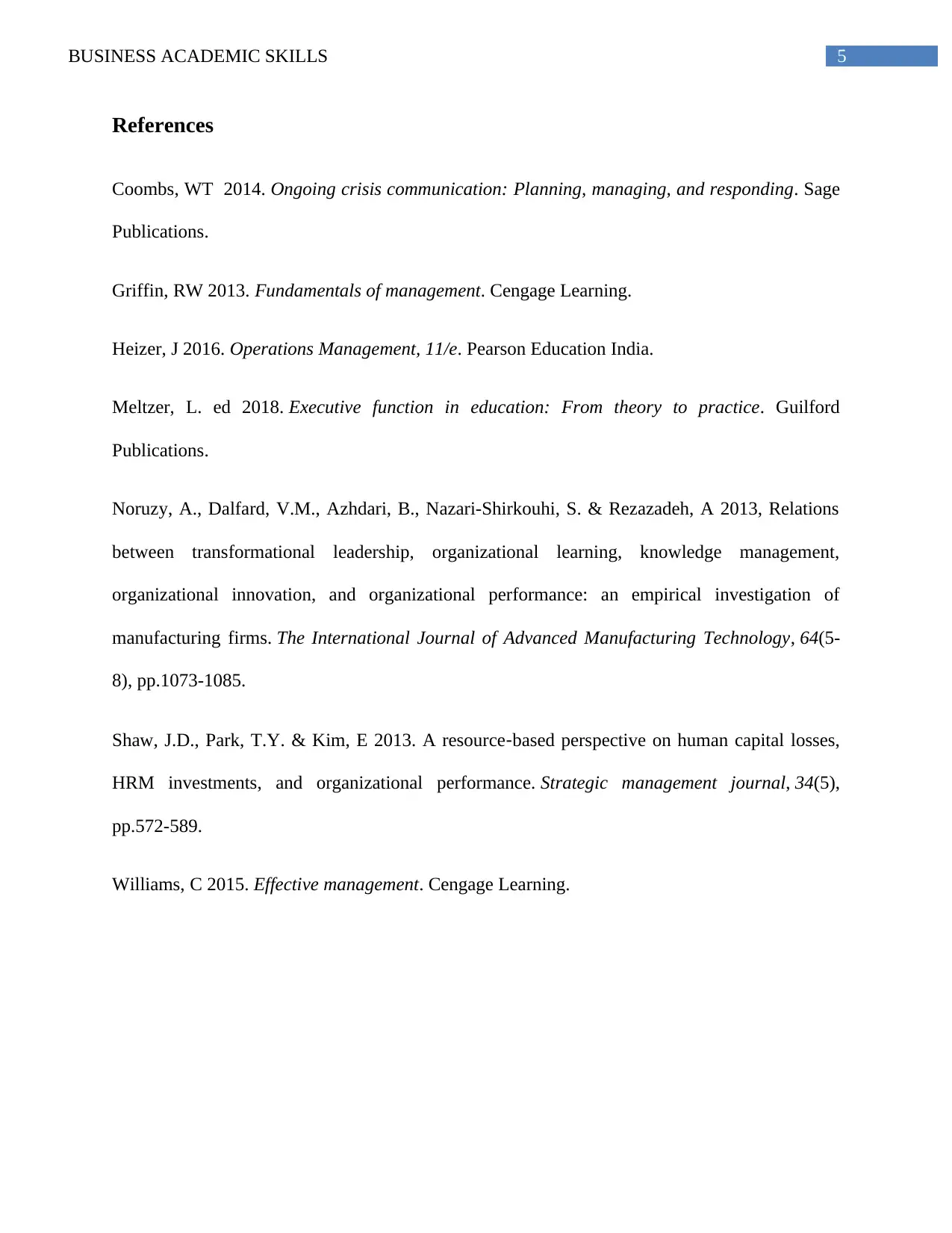
5BUSINESS ACADEMIC SKILLS
References
Coombs, WT 2014. Ongoing crisis communication: Planning, managing, and responding. Sage
Publications.
Griffin, RW 2013. Fundamentals of management. Cengage Learning.
Heizer, J 2016. Operations Management, 11/e. Pearson Education India.
Meltzer, L. ed 2018. Executive function in education: From theory to practice. Guilford
Publications.
Noruzy, A., Dalfard, V.M., Azhdari, B., Nazari-Shirkouhi, S. & Rezazadeh, A 2013, Relations
between transformational leadership, organizational learning, knowledge management,
organizational innovation, and organizational performance: an empirical investigation of
manufacturing firms. The International Journal of Advanced Manufacturing Technology, 64(5-
8), pp.1073-1085.
Shaw, J.D., Park, T.Y. & Kim, E 2013. A resource‐based perspective on human capital losses,
HRM investments, and organizational performance. Strategic management journal, 34(5),
pp.572-589.
Williams, C 2015. Effective management. Cengage Learning.
References
Coombs, WT 2014. Ongoing crisis communication: Planning, managing, and responding. Sage
Publications.
Griffin, RW 2013. Fundamentals of management. Cengage Learning.
Heizer, J 2016. Operations Management, 11/e. Pearson Education India.
Meltzer, L. ed 2018. Executive function in education: From theory to practice. Guilford
Publications.
Noruzy, A., Dalfard, V.M., Azhdari, B., Nazari-Shirkouhi, S. & Rezazadeh, A 2013, Relations
between transformational leadership, organizational learning, knowledge management,
organizational innovation, and organizational performance: an empirical investigation of
manufacturing firms. The International Journal of Advanced Manufacturing Technology, 64(5-
8), pp.1073-1085.
Shaw, J.D., Park, T.Y. & Kim, E 2013. A resource‐based perspective on human capital losses,
HRM investments, and organizational performance. Strategic management journal, 34(5),
pp.572-589.
Williams, C 2015. Effective management. Cengage Learning.
⊘ This is a preview!⊘
Do you want full access?
Subscribe today to unlock all pages.

Trusted by 1+ million students worldwide
1 out of 6
Related Documents
Your All-in-One AI-Powered Toolkit for Academic Success.
+13062052269
info@desklib.com
Available 24*7 on WhatsApp / Email
![[object Object]](/_next/static/media/star-bottom.7253800d.svg)
Unlock your academic potential
Copyright © 2020–2026 A2Z Services. All Rights Reserved. Developed and managed by ZUCOL.




